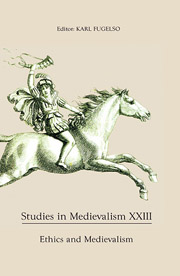Book contents
- Frontmatter
- Acknowledgments
- Contents
- List of Illustrations
- Epigraph
- Editorial Note
- I Ethics and Medievalism: Some Perspective(s)
- The Dangers of the Search for Authenticity? The Ethics of Hallowe'en
- Living Memory and the Long Dead: The Ethics of Laughing at the Middle Ages
- Justice Human and Divine: Ethics in Margaret Frazer's Medievalist Dame Frevisse Series
- The Song Remains the Same: Crossing Intersections to Create an Ethical World via an Adaptation of Everyman for Everyone
- Bringing Elsewhere Home: A Song of Ice and Fire's Ethics of Disability
- The Ethical Movement of Daenerys Targaryen
- II Interpretations
- Contributors
- Previously published volumes
The Song Remains the Same: Crossing Intersections to Create an Ethical World via an Adaptation of Everyman for Everyone
from I - Ethics and Medievalism: Some Perspective(s)
Published online by Cambridge University Press: 05 May 2014
- Frontmatter
- Acknowledgments
- Contents
- List of Illustrations
- Epigraph
- Editorial Note
- I Ethics and Medievalism: Some Perspective(s)
- The Dangers of the Search for Authenticity? The Ethics of Hallowe'en
- Living Memory and the Long Dead: The Ethics of Laughing at the Middle Ages
- Justice Human and Divine: Ethics in Margaret Frazer's Medievalist Dame Frevisse Series
- The Song Remains the Same: Crossing Intersections to Create an Ethical World via an Adaptation of Everyman for Everyone
- Bringing Elsewhere Home: A Song of Ice and Fire's Ethics of Disability
- The Ethical Movement of Daenerys Targaryen
- II Interpretations
- Contributors
- Previously published volumes
Summary
Medieval English morality plays had the same general agenda as contemporary American community theatre has now: to teach values in the face of the challenges of a fundamentally and generally unethical world. In the former, the performance is intended to be more overtly didactic by promoting a particular Christian doctrine of ethics and by working to enforce the development of an ethical soul, all within the further proactive development of an ethical community that has been developed by the Church clergy. In the latter, the performance is more subtle and complex, as it promotes a more general doctrine of ethics and encourages the development of an ethical self, within the proactive development of an ethical community that has been developed by both members and non-members of any number of religious and secular institutions. The specific agenda of a particular medieval morality play and its contemporary adaptation should thus be expected to be different, if only for the reasons of a vast distinction in time, location, and culture.
In the case of the English medieval morality play Everyman, the character Everyman faces the unethical acts of his life as a member of the merchant guild, within the corrosive environment of a growing medieval merchant class that prizes capital investments over spiritual growth.
- Type
- Chapter
- Information
- Studies in Medievalism XXIIIEthics and Medievalism, pp. 31 - 44Publisher: Boydell & BrewerPrint publication year: 2014

